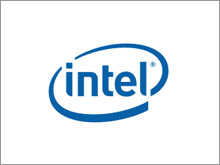|
Intel earnings tumble, stock slides No. 1 chip maker sees net sink 57 percent as sales drop; disappointing guidance hammers shares after-hours. New York (CNNMoney.com) -- Intel Corp. Wednesday reported that profits tumbled 57 percent in the second quarter on falling sales and rising expenses as the No. 1 chipmaker was locked in a dogfight with chief rival Advanced Micro Devices. Intel (Charts) also gave sales guidance for the current quarter that was below Wall Street forecasts, and the news sent its stock sinking about 2 percent in after-hours trading.
"I think it's the go-forward margin and revenue numbers that are disappointing," said Ron Kiddoo, chief investment officer of Champaign, Illinois-based Cozad Asset Management, which holds shares of Intel in its portfolios. "Earnings were pretty good, but their top line was little bit light." The biggest maker of chips for PCs reported net earnings of $885 million, or 15 cents a share, for the quarter, down from $2 billion, or 33 cents a share, a year earlier. Excluding stock option-related expenses, earnings per share were 19 cents. Analysts had been forecasting 13 cents a share. Sales slid 13 percent to $8 billion, short of Wall Street forecasts, while operating expenses jumped 21 percent, the company said. Intel has been locked in a bitter battle with AMD (Charts), its smaller rival, which has grabbed market share from Intel over the past several quarters. Intel has slashed prices on some of its chips and is launching a more competitive product line. Intel recently announced a new lineup of "dual core" chips for servers, laptops and desktops, and began shipping the server chips late in the second quarter. The desktop chips will begin shipping next week. Dual core chips essentially pack two brains onto a single processor. Industry analysts say the new chips are Intel's most competitive product line in years and should help close the technology gap between Intel and AMD. But the rollout of the new products may lead to rough going in the near term, according to Suji De Silva, an analyst for Cathay Financial. "The product transition is not appearing to go as smoothly as they'd hoped," said De Silva. "The key is timing it for market demand and they're hitting a weak environment initially. That's probably what's making it challenging." Guidance disappoints Looking ahead, Intel said sales for the current quarter are expected to be $8.3 billion to $8.9 billion, short of analysts' expectations of $9 billion, according to analysts surveyed by Thomson First Call. "Gross margins were really good - I didn't expect them to be this high," said Martin Kariithi, an analyst with Technology Business Research. But the company lowered its forecast for gross margins, a key measure of profitability, for the current quarter to 49 percent, short of Wall Street's expected 52.1 percent. Kariithi said the better-than-expected margin in the second quarter probably means Intel did not cut prices as much as some had thought. Intel cut prices on some processors during the quarter not only to compete with AMD but also to cut down on inventory in anticipation of new product launches. Kariithi noted that revenues for the digital enterprise group, which makes chips for desktops and servers, plunged 26 percent, from $4.6 billion in the year-ago quarter to roughly $3.4 billion. By comparison, the laptop chip segment fared better, with revenues falling 5 percent, from $2.06 billion to $1.96 billion. "Servers and desktop are really getting killed," said Kariithi. "Their laptop processors are doing pretty well, so that would mean that their new products have not really made a presence in the market yet." In addition to market share losses, the company is struggling with weakening PC demand. Intel is also in the midst of a broad restructuring plan, having recently cut 1,000 managerial positions and sold its communications chip business to Marvell. "We have a tight handle on spending and are identifying ways to (improve) our efficiency and agility," said Intel president and chief executive Paul Otellini in a conference call. Analysts expressed concern with rising inventory levels. Intel reported a 21 percent jump in inventory levels, to $4.3 billion. "I'm not uncomfortable with the level of inventory," said Andy Bryant, Intel's chief financial officer, in the conference call. "Would I like it to be less? Of course. But it doesn't lead to big write offs." Shares of Intel have under performed the Philadelphia Semiconductor Index this year. Intel's shares are down 26 percent this year, while the broader index is down 15 percent. Kariithi does not own shares of Intel, and his firm does not do business with the company. De Silva does not own shares of Intel, and Cathay Pacific does not have banking ties to the company. Related: The Good, the Bad and the Ugly |
|

